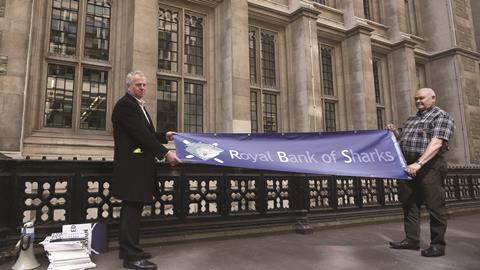News that Royal Bank of Scotland (RBS) is unlikely to face an open court hearing over alleged wrongdoing in the run-up to the financial crisis of 2008 is likely to be a bittersweet moment for those involved.
Days before long-awaited public hearings were due to begin in a case brought by shareholders seeking compensation for a rights issue, the RBS Shareholders Action Group recommended accepting a proposed deal from the bank. The recommended offer, of 82p per share, was expected to be approved as the Gazette went to press. However some shareholders were looking for funds to continue the fight. The offer is 10p per share less than originally claimed and will cost the state-owned bank £200m – on top of legal bills estimated at £129m for what the judge described as ‘serried ranks of solicitors’.

The Gazette understands that around 70% of the 9,000-member group will need to accept the offer. The Honourable Mr Justice Hildyard was due to hear any representations last Thursday.
While aggrieved shareholders will welcome settlement of the three-year-old case, they will not get the satisfaction of seeing RBS’s former chief executive Fred Goodwin crossexamined in court for the first time since the financial crash in which he was a key figure.
In its group legal action, the RBS Shareholders Action Group claims members were misled about the bank’s financial health when RBS issued a rallying call for a £12bn share issue just before it launched the disastrous £49bn takeover of ABN Amro.
The government was later forced to prop up the bank with £45bn of taxpayers’ money to save it from collapse and shareholders subsequently lost around 80% of their investments.
Settlement of the legal action closes at least that aspect of the crisis. The question now is whether further group actions are likely. Reacting to the news, lawyers said the case has shown that shareholder actions can work under the right circumstances.
Simon Hart, partner in the banking disputes team at professional services firm RPC, told the Gazette that litigation funders played a significant role as they allowed many smaller shareholders to pursue a claim for ‘much longer than would otherwise have been possible’.
Andy McGregor, also a partner at the firm, said the case proved third-party litigation funding to be ‘enormously effective’ and that the case would give a further boost to the industry.
However, David Greene, senior partner and head of litigation and group action at commercial firm Edwin Coe, said the case should not be seen as a ‘great advertisement’ for London litigation due to the huge legal costs incurred by RBS.
The bank racked up around £129m in costs after employing a large team of solicitors and counsel.
‘Without close judicial regulation it can be all too easy for well-funded parties to squeeze others out of the court and thus access to justice by an overbearing threat of adverse costs,’ Greene said.
‘Even with insurance the level of costs incurred by RBS could never be covered. In considering costs in these types of cases the court must have in mind ensuring reasonable access to the justice process.’
However, Stephen Rosen, partner at London and Geneva firm Collyer Bristow, said the quantum would be unlikely to deter future cases so long as litigation funders can obtain insurance cover. He added that RBS as a defendant had a tendency to ‘take claims a long way’.
‘It is important to guard against oppressing claimants or their funders.’
Mr Justice Hildyard
‘The high costs will be partly down to the complex issues at stake, but also the nature of the defendant,’ he said.
RBS’s costs were criticised by the court during a preliminary judgment last month. Mr Justice Hildyard said he had ‘great concern’ about the costs of the action – particularly those incurred by RBS. The bank, Hildyard said, was in excess of the ‘huge estimates’ originally given, and had instructed no fewer than 13 counsel and ‘serried ranks of solicitors and paralegals’.
‘It is important to guard against oppressing claimants or their funders by making them pay for a problem that may be the consequence of disproportionate expenditure,’ he added.
International firm Herbert Smith Freehills acted for the bank, which was also represented by two QCs and a barrister from London set Fountain Court Chambers. Herbert Smith declined to comment on whether it employed other legal experts.
RBS Shareholders Action Group was represented by London-based Signature Litigation.
RPC’s Hart said the case is unlikely to set a precedent – but it will affect future behaviour in the City. ‘While this case was in many senses unique in size and scale, and though there will not be a flood of similar cases right away, it does mean that prospective claims relating to prospectuses and listing particulars will be looked at with much greater scrutiny,’ he said.
Greene said the settlement was a ‘neutral outcome’ in terms of future claims. Had the case been lost it would have been the ‘death knell’ for shareholder litigation.
But Rosen said he expected more securities-related litigation off the back of the case. He pointed to two main reasons: people becoming less trusting and the availability of funding to finance large cases. ‘We are also seeing more solicitors willing to take on claims like this,’ he added.
RBS, which denies any wrongdoing, declined to comment.
RBS crisis: Timeline of events
| Jan 2001 | Fred Goodwin becomes chief executive of RBS, which had just quadrupled in size with the acquisition of NatWest. |
|---|---|
| Oct 2007 | RBS announces its takeover of Dutch bank ABN Amro. |
| Apr 2008 | RBS issues £12bn share prospectus. |
| Sep 2008 | Collapse of Lehman Brothers sparks a global financial crisis. |
| Oct 2008 | RBS is bailed out by the government with taxpayers footing the bill. |
| 2009 | RBS Rights Issue Action Group is set up by aggrieved shareholders in attempt to win compensation. |
| Jan 2012 | Fred Goodwin is stripped of knighthood. |
| Dec 2016 | RBS announces the first settlements with shareholder groups. |
| May 2017 | Shareholder group announces it has agreed to accept a settlement offer adding up to £200m. |
































2 Readers' comments